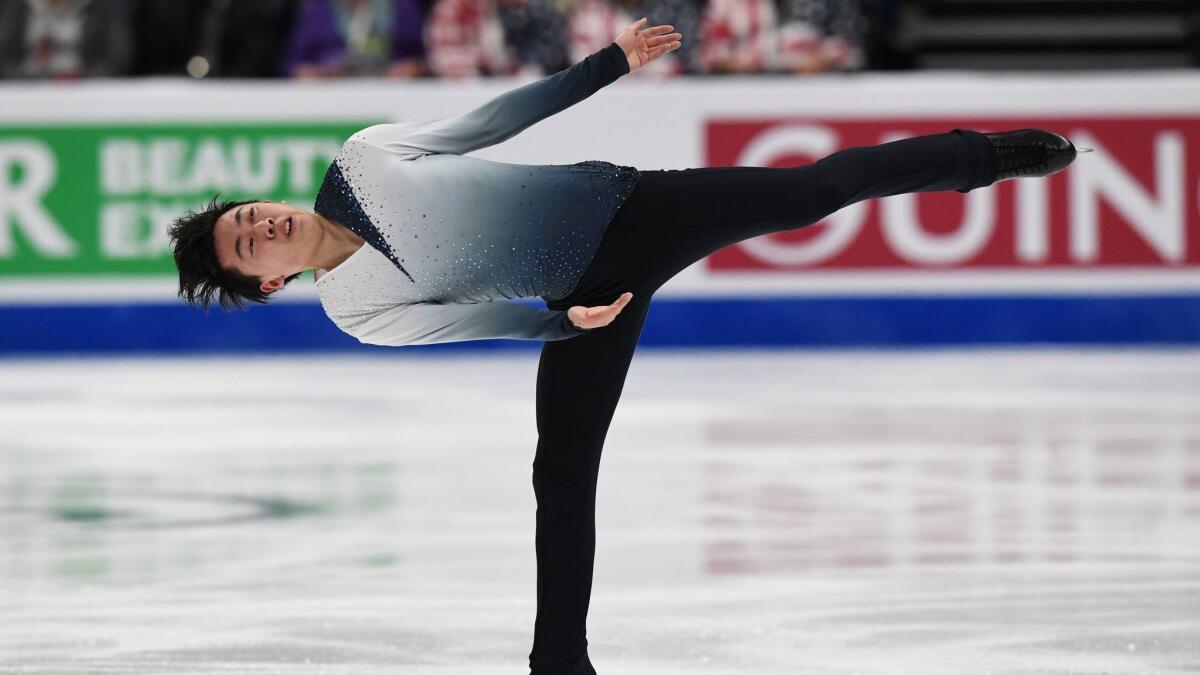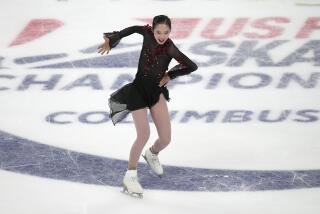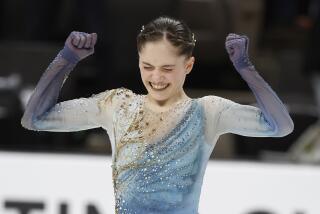Column:: Americans Vincent Zhou and Bradie Tennell lead at Four Continents

Vincent Zhou’s personality is quiet and understated. He describes himself in his Twitter profile as a poet, existential contemplator, and bookworm, among other gentle pursuits. He’s not usually demonstrative after he performs, which made his fist pump noteworthy after his spectacular short program gave him the lead in the men’s competition at the Four Continents Figure Skating championships at Honda Center.
“I was happy, happy with how I skated,” he said, almost bashfully. “There’s not really much more to say.”
There is plenty to say about Zhou, who landed two excellent quadruple jumps, one of them a quadruple lutz-triple toe loop combination, to earn a personal-best 100.18 points. Zhou, the runner-up to Nathan Chen at the recent U.S. championships, had long battled the bad habit of under-rotating his quadruple jumps and losing points for that. The judges on Thursday saw his performance as clean, though he found fault with his triple axel jump and a spin.
“It feels great to finally put out what I know I’m capable of,” said Zhou, 18, of San Jose who was sixth at the 2018 Pyeongchang Olympics. “I’m capable of even better than that. I felt like I was actually a little tight, from the nerves. I’ve performed better programs than that in practice.”
Junhwan Cha of South Korea, whose program included a fine quadruple salchow, is second with 97.33 points, ahead of defending champion Boyang Jin of China (92.17). Olympic silver medalist Shoma Uno made a couple of mistakes but got the highest score for his program components — considered the artistic scores — and ranked fourth (91.76). Jason Brown of the U.S., who stumbled on his triple axel but got the second-best program component scores, ranks sixth with 86.57 points. “I’m proud of the recovery from that moment forward,” said Brown, who plans to perform a quadruple salchow in his free skate on Saturday in an attempt to cleanly land a quad for the first time in competition.
Tomoki Hiwatashi, who was fourth at the U.S. championships but was assigned to compete here when Yale freshman Chen skipped this event, scored 76.95 points to rank ninth. “I still don’t feel like that was the best I’ve done but I also feel that was very organized and I put everything together very nicely. So I’m very satisfied with that,” said Hiwatashi, 19.
The women’s event also has an American atop the standings.
Bradie Tennell’s consistency and technical expertise have been her greatest assets. Her jumps and spins are usually flawless but she lacked the expressiveness that elevates great skaters above good ones, even though she won the U.S. title in 2018 and contributed to a team bronze medal at the Pyeongchang Olympics.
Her short program on Thursday featured a new and welcome sense she was emotionally engaged, which complemented her proficiency and put her in the lead halfway through the women’s event. “I’ve really worked hard on my artistry and trying to step up my game in that department so to have people recognize that, it makes all the hard work worth it,” the 21-year-old from suburban Chicago said after scoring 73.91 points in an afternoon session.
Kaori Sakamoto, the Japanese champion and defending Four Continents champion, is second with 73.36 points entering Friday’s finale. American Mariah Bell, who trains in Lakewood with coach Rafael Arutunian, was third with 70.02 and Eunsoo Lim of South Korea — who also trains in Lakewood — is fourth at 69.14. A third American, 16-year-old Ting Cui of Baltimore, is a solid seventh with 66.73 points. “It’s great to have two American ladies in the top positions, on home ice,” said Tennell, who lost her U.S. title two weeks ago to 13-year-old Alysa Liu. Because Liu is too young to compete here, Cui was sent instead. Tennell and Bell will compete at the world championships in Saitama, Japan, in March.
Skating to “Rebirth” by Hi-Finesse, Tennell finessed a triple lutz-triple toe loop combination as well as a double axel and triple flip. Sakamoto got 33.38 points for her program component scores , ahead of Tennell’s 33.32. But Tennell had the best technical element score, 40.59 to Sakamoto’s 39.98. “I would give myself a 98% today,” Sakamoto said through an interpreter. “My last spin was unstable ... . In my free program I would like to have a powerful performance like I did at the national championships.”
Zhou had a quietly powerful performance on Thursday that spoke volumes about his progress. “I believe that regardless of what it is, if you work on something, over time it will get better,” he said of his previous flaws. “There’s no magic technical correction.”
Follow Helene Elliott on Twitter @helenenothelen
More to Read
Go beyond the scoreboard
Get the latest on L.A.'s teams in the daily Sports Report newsletter.
You may occasionally receive promotional content from the Los Angeles Times.






